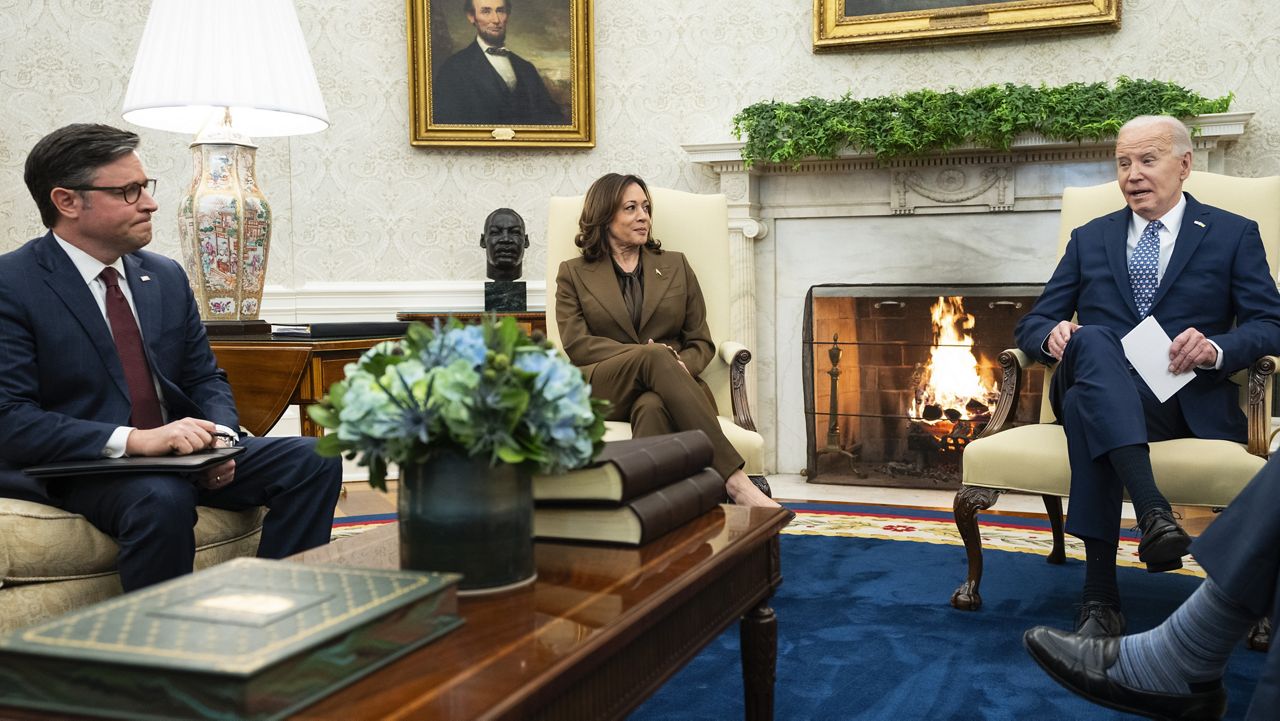President Joe Biden on Friday signed a short-term spending measure into law that will keep federal agencies operating through March 8 and another set through March 22, narrowly avoiding a shutdown for parts of the federal government that would otherwise kick in Saturday.
"This bipartisan agreement prevents a damaging shutdown and allows more time for Congress to work toward full-year funding bills," Biden said in a statement Thursday night. "That’s good news for the American people. But I want to be clear: this is a short-term fix—not a long-term solution."
The short-term extension is the fourth in recent months, and many lawmakers expect it to be the last for the current fiscal year, including House Speaker Mike Johnson, who said that negotiators had completed six of the annual spending bills that fund federal agencies and had “almost final agreement on the others.”
“We'll get the job done,” Johnson said as he exited a closed-door meeting with Republican colleagues.
The vote to approve the measure was 320-99. It easily cleared the two-thirds majority needed for passage. A majority of Republicans voted in favor and all but two Democrats voted yes. The Senate passed the bill 77-13 Thursday evening.
At the end of the process, now expected to extend into late March, Congress is set to approve more than $1.6 trillion in spending for the fiscal year that began Oct. 1 — roughly in line with the previous fiscal year. That's the amount that former Speaker Kevin McCarthy negotiated with the White House last year before eight disgruntled Republican lawmakers joined with Democrats a few months later and voted to oust him from the position.
Some of the House's most conservative members wanted deeper cuts than that agreement allowed through its spending caps. They also sought an array of policy changes that Democrats opposed. They were hoping the prospect of a shutdown could leverage more concessions.
“Last I checked, the Republicans actually have a majority in the House of Representatives, but you wouldn’t know it if you looked at our checkbook because we are all too willing to continue the policy choices of Joe Biden and the spending levels of Nancy Pelosi,” said Rep. Matt Gaetz, R-Fla.
But Rep. Chuck Fleischmann, R-Tenn., countered before the vote that shutdowns are damaging and encouraged lawmakers to vote for the short-term extension.
“I want the American people to know Mr. Speaker that this negotiation has been difficult, but to close the government down at a time like this would hurt people who should not be hurt,” Fleischmann said.
The split within the GOP conference and their tiny House majority has bogged down the efforts to get the spending bills passed on a timely basis. With the Senate also struggling to complete work on all 12 appropriations bills, lawmakers have resorted to a series of short-term measures to keep the government funded.
Republican leadership said that the broader funding legislation being teed up for votes in the next few weeks would lead to spending cuts for many nondefense agencies. By dividing the spending bill up into chunks, they are hoping to avoid an omnibus bill — a massive, all-encompassing bill that lawmakers generally had little time to digest or understand before voting on it. Republicans vowed there would be no omnibus this time.
“When you take away Defense and Veterans Affairs, the rest of the agencies are going to be seeing spending cuts in many cases," said House Majority Leader Steve Scalise, R-La. “There are also some policy changes that we pushed through the House that will be in the final product. Of course, some of those are still being negotiated.”
The bill will now head to President Biden's desk for his signature, cutting off a potential shutdown before Friday's midnight deadline.
"In the days ahead, Congress must do its job and pass full-year funding bills that deliver for the American people. And House Republicans must act on the bipartisan National Security Supplemental, which already passed the Senate with overwhelming bipartisan support and would pass the House if it was brought to a vote," Biden said.
"In addition to arming Ukraine as they defend against Russian attacks every single day, this bill will help ensure that Israel can defend itself against Hamas and other threats. And it will provide critical humanitarian aid to the Palestinian people and those impacted by conflicts around the world. Because the truth is, the aid flowing into Gaza is nowhere near enough, and nowhere fast enough," he added. "Innocent lives are on the line."
It is time for House Republicans to put our national security first and move with urgency to get this bipartisan bill to my desk.
The temporary extension funds the departments of Agriculture, Transportation, Interior and others through March 8. It funds the Pentagon, Homeland Security, Health and Human Services and the State Department through March 22.
The renewed focus on this year's spending bills doesn't include the separate, $95.3 billion aid package that the Senate approved for Ukraine, Israel and Taiwan earlier this month, with much of that money being spent in the U.S. to replenish America's military arsenal.
Biden summoned congressional leaders to the White House on Tuesday, during which he and others urged Johnson to also move forward with the aid package. Senate Majority Leader Chuck Schumer said the U.S. can't afford to wait months to provide more military assistance to Ukraine, which is running short of the arms and ammunition necessary to repel Russia's military invasion.
“We’ve got a lot of priorities before us, but we have to get the government funded and secure our border and then we’ll address everything else," Johnson told reporters upon exiting his meeting with GOP colleagues.



